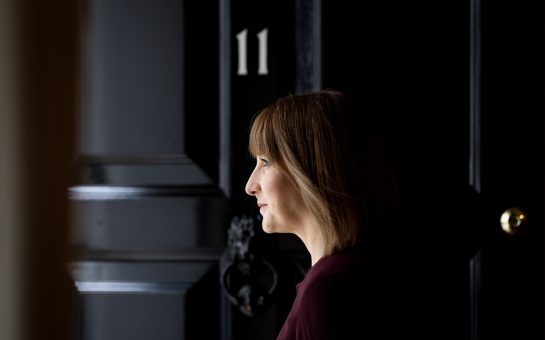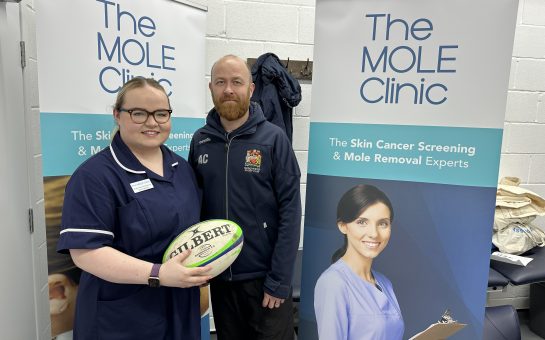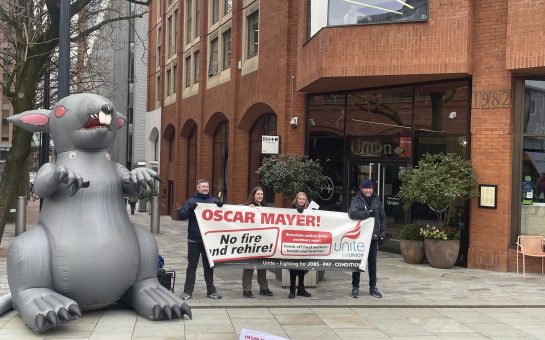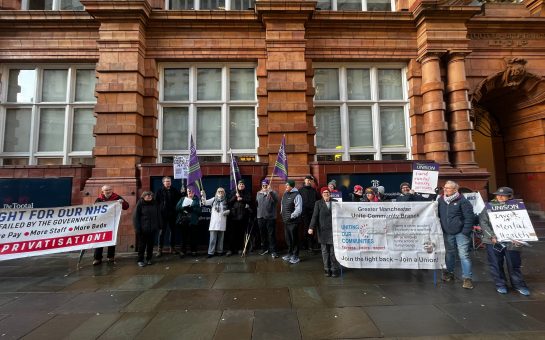Running Labour’s general election campaign is both ‘exhilarating and shattering’ according to campaign chair Andrew Gwynne.
As well as having to fight the good fight for his own seat in Denton and Reddish, Gwynne has been in the Labour war room every day, executing plans to see the party to victory on June 8.
“Essentially we plan out the election from what goes in the leaflets, what goes in advertising, where the battle bus goes to, what speeches certain politicians are making, what interventions are being made by different frontbenchers, by Jeremy as leader, and basically pull together the campaign as much as we can,” he told MM.
They’ve not had long. On April 18 Theresa May called a snap election at a time when the polls suggested Labour would get 25% of the vote and the Conservatives 43%.
As of May 27 Labour appear to be closing – the polls suggesting 36% of the vote is theirs, putting them only eight points behind the Tories.
In a Q&A with Andrew Gwynne, MM discussed Labour’s current poll success, the finer details of running a campaign, whether John Prescott is an asset to Labour, Corbyn’s connection to the IRA, and much more.
MM: Hi Andrew, thanks for speaking with me. Just to start off with, could you tell me what your primary duties are as Labour’s campaign chair?
AG: Well, I have to spend some of my time in Denton and Reddish because I’ve got to campaign for myself. I’ve also got to spend some of my time down in London where we have weekly strategy meetings, and plan a grid for the week ahead.
It’s not an exact science but in a grid you have a daily theme that you want to get across, media you want to do, who you want as the message carrier, and so on.
The Tories and the Liberals do the same which means that sometimes it doesn’t quite go the way you want it to.
Events can also take over, for example, the tragic incident in Manchester last month effectively wiped a whole week out of the grid.
It’s interesting that you mentioned how the Tories and Liberals’ actions can get in the way of some of your plans. How much of your campaign is planned ahead of time and how much of it is a reaction to the actions of opposing parties?
It’s mostly about 50/50.
Obviously you want to get your point across on a particular day, on a particular issue, so that’s the proactive side that’s in your grid.
But you’ve also got the rebuttal side of the things that the Tories, Liberals, or any other party want to get across because they’re in the business of attacking you.
To be able to coordinate a campaign of this size, you must have a huge workforce. How many people does it take to run a campaign at this level?
At a national level, hundreds.
We’ve got the whole of the Labour party headquarters from press to policy, you have the organisational side who run events and recce certain venues, right the way through to organisers on the ground making sure that all the materials get out to the right seats at the right time.
It’s a massive operation and I’m just one of the generals in the war room planning ahead for the many thousands of volunteers who get the job done on the ground.
The snap election was a shock to most of us – I certainly didn’t see it coming – was it a complete surprise to you or were you prepared for it?
We actually put some preparations in place as there had been rumours circulating around Westminster since Christmas that she might go for an early election.
One of the things we got done in the weeks before she called the election, was a snap election guide which was kind of an off-the-shelf guide for candidates.
It included such things as: winding up your office, the things that you can and can’t do during an election campaign, the timetables, the materials you need to think about, the leaflets, and the time it takes to get the leaflets to the printers to be ready for delivery at crucial times of the campaign.
In this respect we were one step ahead of the Tories.
On the topic of being prepared, did you devise any of Labour’s manifesto before the election was announced?
Yeah, in some areas we did.
In the run up to the local elections we had already started announcing some of the Labour policies.
Policy development is usually a five-year process, and we’re a democratic party so it goes through party members at the local level, then it goes up to the national policy forum, from the national policy forum it goes to an annual conference where there are votes on what our policy should be. That’s the usual mechanism over a five-year cycle.
We had to fast track all of that so we did great work in getting together what has turned out to be a very popular manifesto with some really good, fully-costed policies, in a very, very short period of time.
WATCH: It’s been an honour to represent Denton and Reddish in Parliament for the past 12 years. It’s more than a job, it’s my home. pic.twitter.com/x4SM4lVkgf
— Andrew Gwynne (@GwynneMP) May 8, 2017
We effectively crunched five years’ worth of work into a couple of weeks to get the manifesto in place.
Why did you feel you had to release a separate document for costing? Was it because Corbyn had been criticised for announcing expensive policies?
If we want to have fully funded public services we need to be honest and open about how to pay for them and for too long in this country we have been handing out tax cuts to those at the very top of society.
In the last seven years the richest people and the biggest corporations in Britain have had a £70b tax giveaway. At the same time all of our public services are crumbling under stress, strain, and underfunding.
We can fully fund our health service, we can look after our elderly with dignity and we can ensure that students aren’t crippled with £50,000 worth of debt before they’ve even started out in life.
The money we need is there, it’s just that the previous governments – the coalition and the Tory governments – have decided to use it as tax giveaways to those at the very top.
We think that’s the wrong priority: we should be spending it on rebuilding Britain and creating a fairer and more equal society.
The poll gap between the Tories and Labour has significantly reduced, to the point in which Labour are only eight points behind. Which parts of your campaign have contributed to this the most?
At the end of the day polls will change and the only poll that matters is the poll on June 8.
I think what has happened over the duration of this campaign is that people have listened to the vision that Labour has set out, agreed with a lot of the policies that are in the manifesto and understood how we are going to pay for those pledges.
Has the UK ever seen anything like this before? pic.twitter.com/A5iB5NQ8Oc
— Matt Turner (@MattTurner4L) June 6, 2017
We don’t want to fall foul of some of the mistakes the Liberal Democrats made – promising the earth and then delivering the complete opposite in government – we want to rebuild trust in politics and make people realise that politics can make difference.
After the Second World War – when the British economy was completely decimated – it was a transformational Labour government that introduced the National Health Service, the education system, the welfare state, and rebuilt our country’s infrastructure.
We did that on the back of literally nothing, but people had hope and they had belief that politics and politicians could make a difference.
Well now it’s time to do the same and I think that that vision has particularly resonated with young people, who don’t traditionally vote in big numbers, but realise that this country’s future is now in their hands.
They have an opportunity to vote for a different kind of politics, one that will look after them and look after their interests for the future.
Speaking of old Labour governments, John Prescott has recently climbed aboard your battle bus and has been asking people to vote for Jeremy Corbyn. Do you think having him on your side has had a positive effect on the Labour campaign?
I think it certainly has because with John Prescott you’ve got a link to the past. We should always be proud of the achievements of the last Labour government.
It’s easy to be critical of the things we did or didn’t do, things people think we got wrong, but actually those 13 years in government made a tremendous difference to so many lives.
Things like the national minimum wage, rebuilding over 100 hospitals, massive investment in education, Sure Start – which gave early years a priority that it never had before and it’s not had since – we did some great things in government and John Prescott is a good reminder of that.
The other thing is that John Prescott is working class, he resonates with the traditional Labour vote and he is just one of our best campaigners, he always has been.
He’s got that common touch, people warm to him and he says it as it is. You know sometimes in this overspun media world that we live in, where we’re frightened of saying things in case they get twisted and go viral on twitter, John Prescott is a breath of fresh air because he campaigns the traditional way.
This is a picture of Jeremy Corbyn addressing a crowd in Gateshead.
We never pulled crowds like this in 1997. #GE2017 pic.twitter.com/YsWPi7z7Lk— John Prescott (@johnprescott) June 5, 2017
He stands in the town squares, he gives it what for, people know where he’s coming from and I think there’s a place for that in modern politics.
People don’t want their politicians to be robots they want them to be ordinary human beings, they want the kind of people that they see on the market square or that they have a drink with in the pub.
He’s been one of the stars of Labour’s campaign!
Barry really is the People’s Gardiner! #GE2017 pic.twitter.com/Hf89hhSgc6— John Prescott (@johnprescott) June 5, 2017
Jeremy Corbyn could easily deny the accusation that he supported the IRA, so why do you think it is that he’s chosen to avoid saying that and has instead insisted his meetings with them were crucial to Ireland’s peace process?
It took brave decisions, 20 years ago, to bring republicans and unionists together.
Northern Ireland, the United Kingdom and the Republic of Ireland are far better places because of those pretty tough decisions that were taken by politicians of all persuasions.
The Thatcher government was meeting the IRA behind the scenes all through the 1980s, the Major government was the government that went public with meeting the IRA, and it was the Labour government under Tony Blair and the brilliant leadership of Mo Mowlam as Northern Ireland’s secretary, that secured the Good Friday Agreement.
It’s easy to look back and be critical but it took some pretty brave people across the political spectrum to think the unthinkable in the 1980s and the 1990s to bring that bitter period of our history to an end.
I have one final question for you: are you looking forward to the campaign being over?
Yes, because it is exhilarating but it is also shattering.
All my days have merged into one. If you ask me now what the day is I couldn’t tell you because it’s just been one massive whirlwind.
For example this morning (May 29) I got up at the crack of dawn to do Good Morning Britain, to do LBC, to do Sky Sunrise, to do the BBC today programme, I’m now doing you, and I’ll be in the spin room for the leader’s debates on Sky News tonight – God only knows what time I’ll get to bed – I’m then up at the crack of dawn to get the train back to Manchester to do some campaigning in my constituency.
That is a pretty standard snapshot of any particular day in my life at the moment.
Well thanks so much for your time and best of luck with the campaign!
Image courtesy of Andrew Gwynne via Twitter, with thanks.



